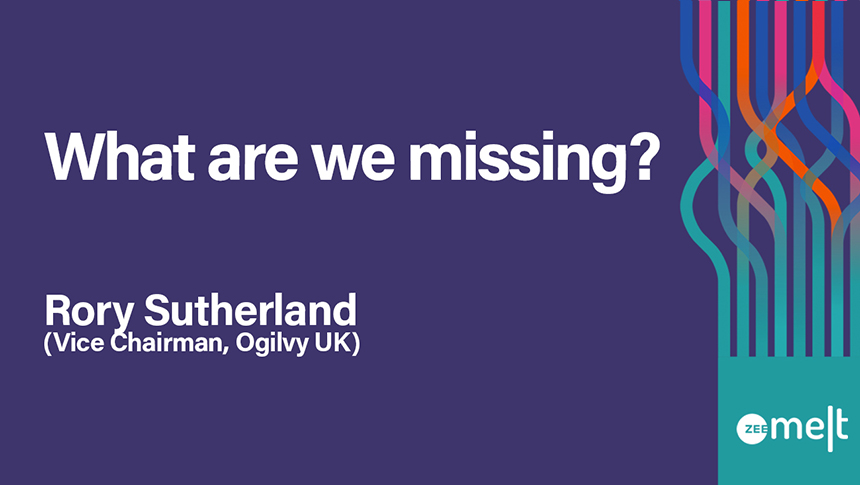
a. How Brands Grow: What Marketers Don’t Know, by Byron Sharp:
An eye-opener. This is a must-read book that challenges marketers to question many of their past practices, beliefs and experiences, proving them to be baseless, scientifically. Do you think differentiating a brand is vital? Customer retention cheaper than acquisition? People have special reasons to buy brands and different brands appeal to different consumer types? Targeted and marketed better than mass? Well, if so, you’re in for quite a shock. Through his vigorous scientific scrutiny, Sharp breaks all current marketing beliefs. This is a must-read book to make CEOs and marketers see their learnings and decision-making in a new light.

b. Decoded: The Science Behind Why We Buy, by Phil Barden:
CEOs and marketers typically rely on their experiences and gut feeling to make most of their decisions. Till yesterday, this was possibly the right way to do so. But today, the consumers have changed. And so has their decision-making. This book awakens us to cognitive reasoning, to better understand why and how consumer’s take decisions. Though we may not realise it, cognitive reasoning is quite taxing and a mental strain. Therefore, to cope, we often make use of many mental shortcuts to ease our decision making process. This book explains the aforementioned phenomenon and then further goes to share how it can be used to a marketer’s advantage. Not only that, it also plays how by not keeping this in consideration, many marketers have lost out.
 c. Ogilvy On Advertising, by David Ogilvy:
c. Ogilvy On Advertising, by David Ogilvy:
The first book I read after entering this profession. And have yet been able to get off my mind. Ogilvy, the advertising legend, was far ahead of his time. And his thinking remains extremely relevant, many decades since he wrote this book. “ I hate rules!”. This best sums up his philosophy. And the reason why this book remains relevant, today, when the rules of the marketing game have changed, so dramatically.
This simple, direct and captivating book is a classic guide to the world of advertising and brand building. In his no-nonsense way, Ogilvy asserts his principles on advertising, use of celebrities, importance of research that hone in his view that advertising must sell. This book, according to him, is for those young hopefuls and veterans who are still in search of ways to improve their batting average at the cash register.
 d. Competing On Analytics, by Thomas Davenport:
d. Competing On Analytics, by Thomas Davenport:
A practical perspective on the power of analytics and how it can transform your business.
Typically, CEOs and CMOs tend to take future impacting decisions based on their personal experiences and learnings, from the past. However, analytics tests your assumptions and helps you quantify the likely impact of a knowledgable decision. While this realization has dawned on the C suite, many are hesitant and have yet to start on this journey. They have many questions that remain unanswered. And thus they remain hesitant to take the first step. This book helps simplify the why, what and how to get you started on the journey that can become your secret sauce for a competitive edge.
 e. Reputation — Realising Value From The Corporate Image, by Charles J. Fombrun:
e. Reputation — Realising Value From The Corporate Image, by Charles J. Fombrun:
Typically corporates remember the power of PR and its impact on the corporate’s reputation only in very good/bad times. The book shares the importance of building and earning a reputation, a fragile asset, that lasts through good times and bad.
This book is especially relevant in the VUCA times that we live in, when nothing more than a tweet can demolish the image of an individual or corporate. This book helps CEOs and marketers understand the hidden value of a company’s fragile asset — its reputation. They will realize the importance of what, typically, is ignored or forgotten — until a crisis strikes — how to protect, manage and enhance reputation, deriving economic benefits from it. It builds a case that good reputation accrues economic returns and therefore needs to be on the agenda of CEOs and CMOs. It makes you realize that it’s not merely the media, but every stakeholder experience that makes or damages the corporate’s reputation.
Q: The number of times per year you take holidays and why holidays are important
A: At an average, once a year. Though wish, twice. A break from the routine. A time to be with the family. A time to be with yourself.

Q: Your personal definition of a brand.
A: The emotion and imagery that comes to my mind, on hearing the name of the brand. When a product touches your heart, rather than your wallet.
Q: Your take on what digital will do for India – for companies, for women, for youth, for society.
A: Many things for many people. It will bring the world to your fingertips. Digital will bring forth convenience. It will empower and scale up companies. It will allow you to dream big, do big. Additionally, it will increase entertainment, knowledge, and information.
Q: Your must-have gizmos and gadgets.
A: My iPhone. My power pack. Allows me to plan and live my life. 24X7.


